Impeachment, Lawyers and the Views from the War Rooms
Attorneys who worked on proceedings of the past share how they navigated an arena with little guiding precedent.
October 24, 2019 at 11:29 PM
11 minute read
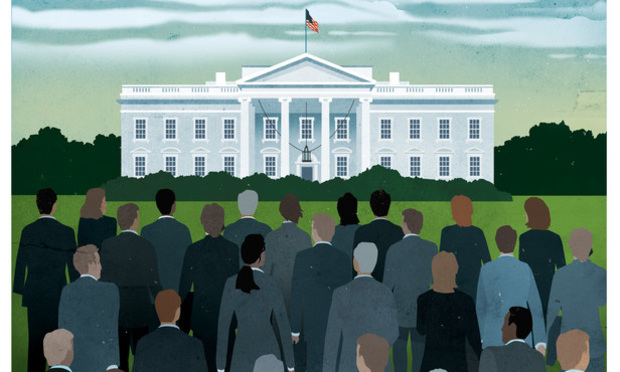
When David Dorsen joined the Senate select committee on Watergate in 1973, it was less than a month before the panel's historic hearings began airing on national television.
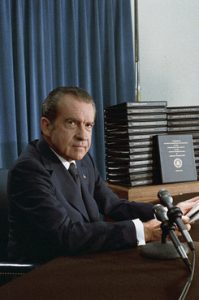 President Richard Nixon with his edited transcripts of the White House Tapes subpoenaed by the Special Prosecutor, during his speech to the nation on Watergate, on April 29, 1974.
President Richard Nixon with his edited transcripts of the White House Tapes subpoenaed by the Special Prosecutor, during his speech to the nation on Watergate, on April 29, 1974.For lawyers like Dorsen, who stayed largely behind the scenes during the Senate probe, there was pressure not to just keep up with the pace of the investigation, but to make sure the right questions were asked of the right witnesses. The stakes were high as the staff looked into a matter as significant as potential wrongdoing by President Richard Nixon.
The time crunch was so tight that Dorsen at one point had to tell Sen. Sam Ervin, D-North Carolina—who chaired the select committee—that one of the hearings would have to be adjourned after opening statements. Lawyers weren't ready to question the witness.
"He forgot, and I had to remind everyone not to question him," Dorsen recalled. "As a professor might be one step ahead of his students, we were less than that ahead of the television."
Lawyers who have worked on past impeachment proceedings against Nixon and President Bill Clinton remember pressures like these from their time working on the inquiries. And they advise attorneys tasked with handling the impeachment inquiry of President Donald Trump to keep those demands in mind.
'Norms, Not Rules' Govern
Attorneys involved in impeachment proceedings for Nixon and Clinton said they had to essentially come up with procedures and legal arguments from scratch, as the last presidential impeachment was Andrew Johnson's in 1868.
 U.S. President Donald Trump speaks during a news conference with Sauli Niinisto, Finland's president, not pictured, in the East Room of the White House on Oct. 2, 2019. Photographer: Al Drago/Bloomberg
U.S. President Donald Trump speaks during a news conference with Sauli Niinisto, Finland's president, not pictured, in the East Room of the White House on Oct. 2, 2019. Photographer: Al Drago/BloombergAnd as they found themselves in court, litigating issues like what evidence could be given to Congress, they created new road maps that have guided the way for future impeachment proceedings. But that doesn't mean the law surrounding impeachment is settled by any means.
"Whatever side you're on, you have to be very creative as a lawyer to make the most persuasive arguments," said Mark Alexander, dean of the Villanova University Charles Widger School of Law. "And there's a lot that's just not defined on impeachment."
As the House of Representatives embarks on its latest impeachment inquiry into Trump, attorneys emphasized the need for counsel on all sides to act thoroughly and methodically as they investigate allegations that Trump pressured Ukrainian authorities to investigate his political rival, former Vice President Joe Biden and Biden's son, Hunter.
Dorsen said staff working on Watergate went out of their way to track down all lines of inquiry—at one point even interviewing the Hollywood icon John Wayne after former White House counsel John Dean said he was asked to "do something" about an IRS audit of the actor.
While the Wayne audit ultimately didn't factor any further into their investigation, Dorsen said it was important for the committee to make sure it followed up on every potential act of presidential misconduct.
"We spent hundreds of hours literally searching for things like that, that never had an impact ultimately," Dorsen said. "But it's part of the job of an experienced investigator and prosecutor. I hope they know enough about that in the present setup to do the kinds of things that we did, whether they panned out or not."
Even with past examples to look back on, experts say there's plenty of legal territory on impeachment to explore. That includes how impeachment proceedings are conducted in the first place.
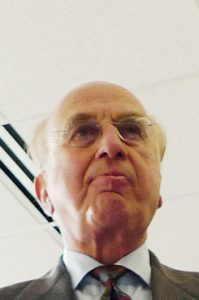 David Dorsen
David Dorsen"When you have an administration that is less norm bound, then a lot of this becomes much more unstable and far more fragile. And we saw that in the Mueller investigation, and so we're probably going to see the same kind of thing here," said Melissa Murray, a constitutional law professor at New York University School of Law.
"Maybe it's the case that the norms hold because the specter of impeachment is so much more profound than perhaps any other kind of ordinary oversight investigation," she said. "But most of this work is governed by norms, not rules."
Michael Gerhardt, a constitutional law professor at the University of North Carolina, noted that impeachment is an inherently political process, even as it borrows heavily from legal proceedings. But the political nature doesn't mean impeachment should be led solely by politicians, he said.
"Yes, presidents and their lawyers understand that part of this game is to sort of manage the political side of impeachment, which is gigantic. But there's, at the same time, a legal side that has to be dealt with more professionally," said Gerhardt, who testified in the Clinton impeachment hearings as a bipartisan witness.
Rushing to Keep Up With Watergate Hearings
Dorsen, who later joined the defunct law firm Sedgwick, said lawyers on the Watergate committee put in long hours to keep up with the demands of the investigation.
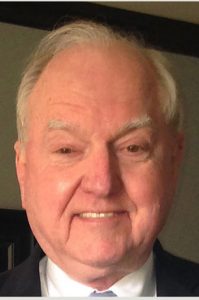 Michael Conway, retired partner at Foley & Lardner.
Michael Conway, retired partner at Foley & Lardner.Attorneys on the team wanted to be thorough and recognized the gravity of the moment, he said. That meant the staff often showed up early. They often worked late and on weekends.
The extra hours didn't go unrecognized.
One weekend, the committee's chief counsel Samuel Dash locked the doors to the room where they had been working. His goal was to prevent burnout and force the team to take a break, Dorsen said.
"We just couldn't get in, and we were chomping at the bit," he said.
When the Senate committee wrapped up its investigation, the House Judiciary Committee was waiting in the wings to decide whether to push forward with impeachment. House Judiciary staffers—including a young attorney named Hillary Rodham—began their work on the inquiry by drafting a legal memo on the history of impeachment and how it should be conducted.
The Judiciary Committee held hearings and called witnesses, but it was more focused on combing through the evidence gathered to build the case against the president.
Michael Conway, an attorney on the committee, said he and other staffers spent hours combing through the evidence and writing down facts on index cards. The statements on those cards would later serve as the foundation upon which articles of impeachment were drafted and filed.
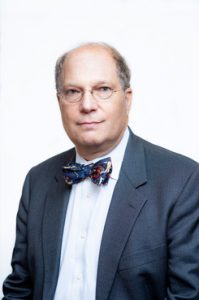 Paul Rosenzweig, with Red Branch Consulting.
Paul Rosenzweig, with Red Branch Consulting.The committee had to show whether Nixon committed a "high crime or misdemeanor," the Constitution's grounds for impeachment. Several Republicans joined Democrats on the committee to advance three articles of impeachment against Nixon, while two others were rejected.
Nixon, as we know, resigned before those articles could make it to the House floor, after the release of secret tapes revealed him discussing covering up the White House's connection to the Watergate break-in.
For the committee's lawyers, the president's resignation brought work to a screeching halt. Conway, now a retired litigation partner with Foley & Lardner, said he was struck by how normal the scene outside the White House was as he passed it on his way home the night of Nixon's resignation.
"There are no protests, no demonstrators, there's nobody. It's just an ordinary summer night," Conway said. "And yet the most dramatic change in our democracy had just happened."
Ken Starr & The Clinton Info 'Dump'
Paul Rosenzweig was bored in his role as counsel for the House Transportation Committee when he was offered a spot on independent counsel Kenneth Starr's investigation on Bill Clinton in the fall of 1997. The probe, housed on Pennsylvania Avenue just outside the Department of Justice, was set to wrap up within the next year or so, but the team was analyzing its findings for a final report, an area in which Rosenzweig said he excels, so he took the job.
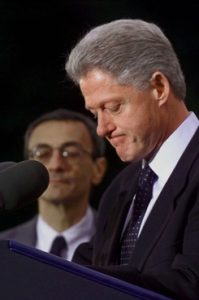 President Clinton prepares to speak following the impeachment vote by the House of Representatives on Dec. 19, 1998. (AP Photo/J. Scott Applewhite)
President Clinton prepares to speak following the impeachment vote by the House of Representatives on Dec. 19, 1998. (AP Photo/J. Scott Applewhite)Everything changed when it broke that Clinton had an affair with White House intern Monica Lewinsky and that he may have lied about it under oath.
"All of a sudden, it went from a place that not many people were joining to a place that everybody was trying to be," Rosenzweig said of Starr's team.
Adam Goldberg, then a special associate counsel in the Clinton White House, who focused on crisis management and working with the media, said the initial strategy of the Clinton team was to "dump every bad piece of information out there."
The independent counsel at first focused on topics including real estate dealings, campaign finance and the handling of the White House's travel office, but the Clinton White House began resisting requests for information and evidence once the Lewinsky allegations came out. "The strategy and approach was night and day," Goldberg said of the White House's later response to information requests.
Rosenzweig said lawyers on Starr's team had to get more creative about how they were going to get their hands on evidence the Clinton White House argued was privileged.
"There was a lot of pulling on our chins and saying, 'What if? How about this?'" Rosenzweig said. "Much of which went by the wayside, because in that sort of situation, you really aren't in a good position to ground your argument in a firm history."
"So eventually we settled on a series of arguments that wound up winning, and maybe make it easier for the next generation of people to do," he added.
Starr's team, in a series of court cases that remain under seal, generally claimed that executive privilege couldn't be applied to the Clinton-Lewinsky matter because it involved personal issues and not official White House duties.
By the time he left the investigation, Rosenzweig said he had in-depth knowledge of areas of the law that don't come up very often, like separation of powers or when executive privilege can be asserted.
"I remember saying to my wife something along the lines of 'well, that's two years of legal expertise I'll never get to use again,'" he said.
'Relief' and 'Sadness'
Goldberg said the Clinton White House's combative stance against impeachment continued when the House and Senate became the focal points of the battle.
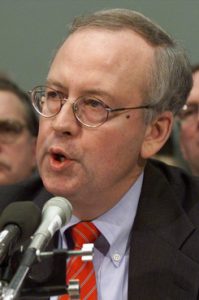 Kenneth Starr gives his opening statement before the House Judiciary Committee's impeachment hearing on Capitol Hill on Nov. 19, 1998. (AP Photo/Doug Mills, File)
Kenneth Starr gives his opening statement before the House Judiciary Committee's impeachment hearing on Capitol Hill on Nov. 19, 1998. (AP Photo/Doug Mills, File)"Even if the allegations could be proven, they didn't rise to the level of impeachment because they were not impeachable offenses," Goldberg said of the White House's argument. "These were about private proceedings and a private affair, not what the founders had in mind."
Goldberg said the lawyers who were not in the Senate chamber for the trial—the first to be held since President Johnson's in 1868—were in a room nearby, where they could watch the proceedings.
He said on the first day of the trial, they walked into that chamber to find a basket of cookies from Republican Sen. Rick Santorum, who had been vocally anti-Clinton on other matters but committed himself to impartiality during the impeachment trial. Santorum would vote to remove Clinton from office.
While the House impeached Clinton, the Senate voted against his removal and the president got to serve the remainder of his term.
For Goldberg, who left the White House before the verdict came down, the outcome was bittersweet. After working vigorously to defend the president from the initial investigations, Goldberg said he felt frustrated that Clinton's personal conduct got in the way of the administration being able to carry out the rest of its agenda.
"So many in the White House for years had labored to get him past investigations, many of the investigations were completely bogus," Goldberg said. "And then to have this happen, it was hard. So when that verdict came down, it was a relief and it was just sort of sadness."
This content has been archived. It is available through our partners, LexisNexis® and Bloomberg Law.
To view this content, please continue to their sites.
Not a Lexis Subscriber?
Subscribe Now
Not a Bloomberg Law Subscriber?
Subscribe Now
NOT FOR REPRINT
© 2025 ALM Global, LLC, All Rights Reserved. Request academic re-use from www.copyright.com. All other uses, submit a request to [email protected]. For more information visit Asset & Logo Licensing.
You Might Like
View All
GOP Now Holds FTC Gavel, but Dems Signal They'll Be a Rowdy Minority
6 minute read
DC Lawsuits Seek to Prevent Mass Firings and Public Naming of FBI Agents
3 minute read

Fired by Trump, EEOC's First Blind GC Lands at Nonprofit Targeting Abuses of Power
3 minute readTrending Stories
- 1Carol-Lisa Phillips to Rise to Broward Chief Judge as Jack Tuter Weighs Next Move
- 2Data Breaches in UK Legal Sector Surge, According to ICO Data
- 3Georgia Law Schools Seeing 24% More Applicants This Year
- 4After Shutting USAID, Trump Eyes Department of Education, CFPB
- 5‘Keep Men Out’: Female Swimmers Sue Ivy Leagues Over Lia Thomas’ Sweep
Who Got The Work
J. Brugh Lower of Gibbons has entered an appearance for industrial equipment supplier Devco Corporation in a pending trademark infringement lawsuit. The suit, accusing the defendant of selling knock-off Graco products, was filed Dec. 18 in New Jersey District Court by Rivkin Radler on behalf of Graco Inc. and Graco Minnesota. The case, assigned to U.S. District Judge Zahid N. Quraishi, is 3:24-cv-11294, Graco Inc. et al v. Devco Corporation.
Who Got The Work
Rebecca Maller-Stein and Kent A. Yalowitz of Arnold & Porter Kaye Scholer have entered their appearances for Hanaco Venture Capital and its executives, Lior Prosor and David Frankel, in a pending securities lawsuit. The action, filed on Dec. 24 in New York Southern District Court by Zell, Aron & Co. on behalf of Goldeneye Advisors, accuses the defendants of negligently and fraudulently managing the plaintiff's $1 million investment. The case, assigned to U.S. District Judge Vernon S. Broderick, is 1:24-cv-09918, Goldeneye Advisors, LLC v. Hanaco Venture Capital, Ltd. et al.
Who Got The Work
Attorneys from A&O Shearman has stepped in as defense counsel for Toronto-Dominion Bank and other defendants in a pending securities class action. The suit, filed Dec. 11 in New York Southern District Court by Bleichmar Fonti & Auld, accuses the defendants of concealing the bank's 'pervasive' deficiencies in regards to its compliance with the Bank Secrecy Act and the quality of its anti-money laundering controls. The case, assigned to U.S. District Judge Arun Subramanian, is 1:24-cv-09445, Gonzalez v. The Toronto-Dominion Bank et al.
Who Got The Work
Crown Castle International, a Pennsylvania company providing shared communications infrastructure, has turned to Luke D. Wolf of Gordon Rees Scully Mansukhani to fend off a pending breach-of-contract lawsuit. The court action, filed Nov. 25 in Michigan Eastern District Court by Hooper Hathaway PC on behalf of The Town Residences LLC, accuses Crown Castle of failing to transfer approximately $30,000 in utility payments from T-Mobile in breach of a roof-top lease and assignment agreement. The case, assigned to U.S. District Judge Susan K. Declercq, is 2:24-cv-13131, The Town Residences LLC v. T-Mobile US, Inc. et al.
Who Got The Work
Wilfred P. Coronato and Daniel M. Schwartz of McCarter & English have stepped in as defense counsel to Electrolux Home Products Inc. in a pending product liability lawsuit. The court action, filed Nov. 26 in New York Eastern District Court by Poulos Lopiccolo PC and Nagel Rice LLP on behalf of David Stern, alleges that the defendant's refrigerators’ drawers and shelving repeatedly break and fall apart within months after purchase. The case, assigned to U.S. District Judge Joan M. Azrack, is 2:24-cv-08204, Stern v. Electrolux Home Products, Inc.
Featured Firms
Law Offices of Gary Martin Hays & Associates, P.C.
(470) 294-1674
Law Offices of Mark E. Salomone
(857) 444-6468
Smith & Hassler
(713) 739-1250








